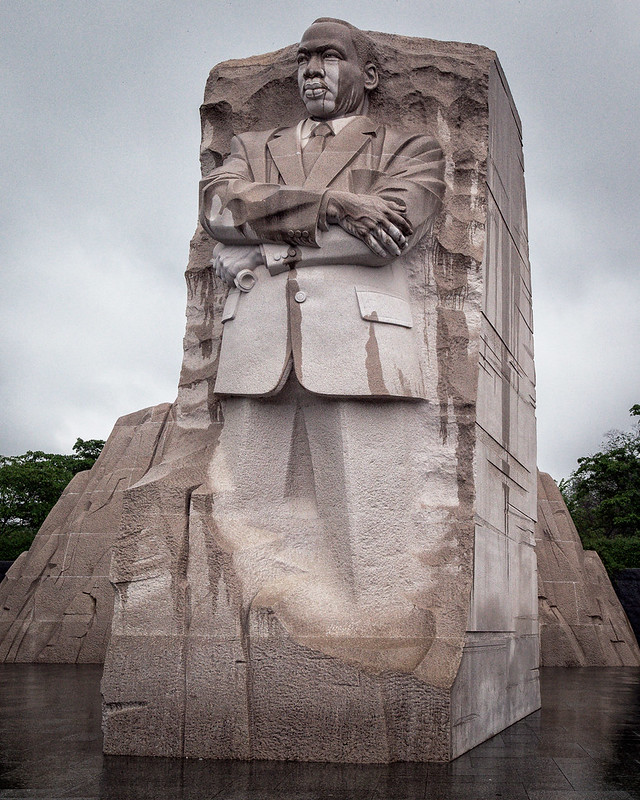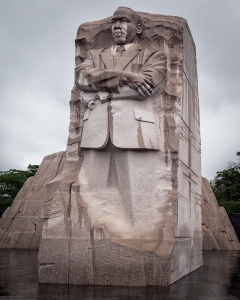While many would point to Martin Luther King’s “I Have a Dream” speech on the steps of the Lincoln Memorial in August 1963 as his most powerful, the words from King that most move me come from a letter written four months earlier, as he sat in the Birmingham jail. It was a letter written to local pastors, who expressed support for his cause but concern for the manner in which he came to Birmingham to protest. When looking back at historical letters, there are some that are products of their time that illuminate the events of that day, but which need footnotes and commentary to explain to contemporary readers.
King’s “Letter from a Birmingham Jail” is *not* one of those letters. I wish it was, but it isn’t. It’s all too clear, and speaks all too clearly even now.
In that letter, King identified “the great stumbling block in the stride toward freedom” not as the hoodwearing Klanners or the politically powerful White Citizens Council folks, but the white moderate. These are folks who
- are more devoted to order than justice
- prefer a negative peace – the absence of tension – to a positive peace – the presence of justice
- constantly say they agree with your goals but not your direct methods for achieving them
- feel no problem in setting a timetable for someone else’s freedom
- live by the myth of time, constantly urging patience until things are more convenient
Anyone who has watched the news at any time over the last three years knows that this great stumbling block to freedom and justice, the Moderate, is an all-too-familiar presence, appearing in various guises. For example . . .
- police officers who, as one African-American after another is beaten, abused, and killed by one of their colleagues, silently watch the attack as it unfolds, who refuse to intervene, who write up reports to cover for this conduct, and who by their silence and their words defend and justify assault and murder done under the color of law;
- staffers at ICE facilities who, as children are separated from their parents, as people are crammed into unlivable facilities, as basic necessities like toothbrushes and soap are withheld, clock in and clock out without saying a word;
- personal assistants, co-workers, and superiors who watch as victim after victim were abused by powerful men like Harvey Weinstein, Roger Ailes, Charlie Rose, Matt Lauer, Jeffrey Epstein, and untold others, and who said nothing;
- Susan Collins, hand-wringer extraordinaire, who expresses her deep concerns about this rightwing nominee or that destructive proposed policy, and nevertheless puts her concerns aside time and time and time again to confirm the nominee or enact the proposal into law;
- media figures who practice “he said/she said journalism,” who twist themselves into pretzels in order to maintain their “access” to inside sources, and who refuse to call a lie a lie in the name of “balance”;
- corporate bean counters, who place such things as quarterly profits and shareholder value ahead of worker safety and well-being, ahead of environmental concerns, or ahead of community partnership, saying “we can’t afford to . . .” when what they really mean is “we choose not to spend in order to . . .”;
- lawyers who provide legal cover to those who abuse, torture, and terrorize, and the second group of lawyers who “let bygones be bygones” in order to not have to deal with the actions of the first group;
- bishops and religious leaders who privately chastise abusive priests and pastors, but who fail to hold them publicly accountable and seek justice, out of a concern to not cause a scandal that would bring the religious organization into disrepute; and
- leaders of sports programs who value winning so much that they are willing to look the other way when coaches, trainers, and doctors abuse athletes.
The tools of the Moderate are things like Non-Disclosure Agreements, loyalty to The Team, and the explicit and implicit power of the hierarchy. The Moderate may not be at the top of the pyramid, but as long as the Moderate can kiss up and kick down, they think they will be OK. They’ll keep their powder dry, waiting for a better time to act. But all too often, the Moderate refuses to use what they’ve been saving for that rainy day, even when they are in the middle of a Category 5 hurricane.
But there are signs of hope, and we’ve seen some of them as well over the last three years:
- career government professionals – at the State Department like Marie Yovanovitch, at the Department of Defense like Captain Brett Crozier of the USS Theodore Roosevelt, at the Department of Health and Human Services like Dr. Richard Bright, at the Department of Justice like Brandon Van Graak, and others like them – who refused to worry about personal consequences to themselves and fudge the data, ignore the facts, shade the advice, or stand silently by while others do so;
- passers-by to acts of injustice, who not only document what is being done but who take action to hold perpetrators to account (NY dog walkers, represent!);
- young voices like Greta Thunberg who refuse to go along to get along, who ask the tough questions of those in power, and who question the answers that mock the truth, and old voices like Elizabeth Warren who do the same; and
- voices of political relative newcomers like Katie Porter, AOC, Stacy Abrams, who do not let their low spot on the political totem pole (or lack of a spot at all) keep them from speaking out for justice.
This past week, longtime AIDS activist Larry Kramer passed away. He founded the Gay Men’s Health Crisis to care for gays stricken with AIDS, while the government turned its eyes away from the problem. Later on, he founded ACT-UP, when he saw GMHC had become too domesticated and unwilling to rock the boat when the boat desperately needed rocking. He called out the gay community and he called out government officials, even those who were trying to help like Anthony Fauci, for not doing anywhere close to what was needed.
And in many respects, it worked. Maybe not as fast as it should have, or as well as Kramer would have liked, but it made a difference. From Kramer’s NY Times obituary:
The infectious-disease expert Dr. Anthony S. Fauci, longtime director of the National Institute of Allergy and Infectious Diseases, was one who got the message — after Mr. Kramer wrote an open letter published in The San Francisco Examiner in 1988 calling him a killer and “an incompetent idiot.”
“Once you got past the rhetoric,” Dr. Fauci said in an interview for this obituary, “you found that Larry Kramer made a lot of sense, and that he had a heart of gold.”
Mr. Kramer, he said, had helped him to see how the federal bureaucracy was indeed slowing the search for effective treatments. He credited Mr. Kramer with playing an “essential” role in the development of elaborate drug regimens that could prolong the lives of those infected with H.I.V., and in prompting the Food and Drug Administration to streamline its assessment and approval of certain new drugs.
In recent years Mr. Kramer developed a grudging friendship with Dr. Fauci, particularly after Mr. Kramer developed liver disease and underwent the transplant in 2001; Dr. Fauci helped get him into a lifesaving experimental drug trial afterward.
Their bond grew stronger this year, when Dr. Fauci became the public face of the White House task force on the coronavirus epidemic, opening him to criticism in some quarters.“We are friends again,” Mr. Kramer said in an email to the reporter John Leland of The New York Times for an article published at the end of March. “I’m feeling sorry for how he’s being treated. I emailed him this, but his one line answer was, ‘Hunker down.’”
Which brings me back to King’s letter and the title of this post:
. . . though I was initially disappointed at being categorized as an extremist, as I continued to think about the matter I gradually gained a measure of satisfaction from the label. Was not Jesus an extremist for love: “Love your enemies, bless them that curse you, do good to them that hate you, and pray for them which despitefully use you, and persecute you.” Was not Amos an extremist for justice: “Let justice roll down like waters and righteousness like an ever flowing stream.” Was not Paul an extremist for the Christian gospel: “I bear in my body the marks of the Lord Jesus.” Was not Martin Luther an extremist: “Here I stand; I cannot do otherwise, so help me God.” And John Bunyan: “I will stay in jail to the end of my days before I make a butchery of my conscience.” And Abraham Lincoln: “This nation cannot survive half slave and half free.” And Thomas Jefferson: “We hold these truths to be self evident, that all men are created equal . . .” So the question is not whether we will be extremists, but what kind of extremists we will be. Will we be extremists for hate or for love? Will we be extremists for the preservation of injustice or for the extension of justice? In that dramatic scene on Calvary’s hill three men were crucified. We must never forget that all three were crucified for the same crime–the crime of extremism. Two were extremists for immorality, and thus fell below their environment. The other, Jesus Christ, was an extremist for love, truth and goodness, and thereby rose above his environment. Perhaps the South, the nation and the world are in dire need of creative extremists.
We’ve got plenty of extremists like Stephen Miller and the cop who knelt on George Floyd’s neck until he died. We’re in dire need of more creative extremists.
Which leaves me with one question: how will you be a creative extremist today?



